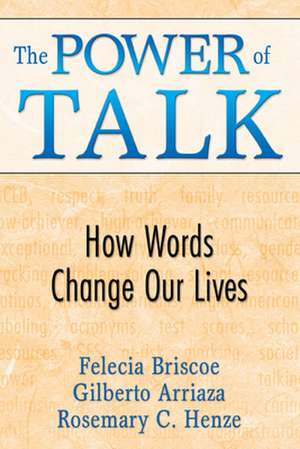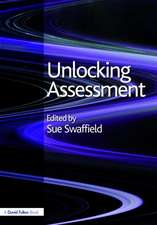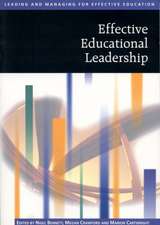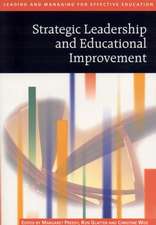The Power of Talk: How Words Change Our Lives
Autor Felecia M. Briscoe, Gilberto Arriaza, Rosemary C. Henzeen Limba Engleză Paperback – 22 mar 2009
Unlock the power of language to promote equity in your school! This enlightening book shows how everyday speech can be a transforming force in today's schools, creating a more equitable environment for people of all backgrounds. Written by experts on language and diversity, this resource combines research-validated tools and real-world insights for addressing verbal communication issues within the classroom and schoolwide. Readers will find:
- Case studies and vignettes that show how language contributes to school change and shapes community relationships
- Thought-provoking exercises that strengthen language awareness and leadership skills
- Guidance on effectively coaching students and colleagues on equity issues and the use of appropriate language.
By using language to overcome barriers, foster collaboration, and promote respect, leaders can make a significant difference in the quality of life and work in schools.
| Toate formatele și edițiile | Preț | Express |
|---|---|---|
| Paperback (1) | 277.81 lei 43-57 zile | |
| SAGE Publications – 22 mar 2009 | 277.81 lei 43-57 zile | |
| Hardback (1) | 471.31 lei 43-57 zile | |
| SAGE Publications – 9 feb 2009 | 471.31 lei 43-57 zile |
Preț: 277.81 lei
Nou
Puncte Express: 417
Preț estimativ în valută:
53.16€ • 55.64$ • 44.25£
53.16€ • 55.64$ • 44.25£
Carte tipărită la comandă
Livrare economică 31 martie-14 aprilie
Preluare comenzi: 021 569.72.76
Specificații
ISBN-13: 9781412956024
ISBN-10: 1412956021
Pagini: 200
Dimensiuni: 152 x 229 x 15 mm
Greutate: 0.3 kg
Ediția:1
Editura: SAGE Publications
Colecția Corwin
Locul publicării:Thousand Oaks, United States
ISBN-10: 1412956021
Pagini: 200
Dimensiuni: 152 x 229 x 15 mm
Greutate: 0.3 kg
Ediția:1
Editura: SAGE Publications
Colecția Corwin
Locul publicării:Thousand Oaks, United States
Recenzii
"In a down-to-earth style, the authors explain how, by paying attention to how we talk, people can make a difference to the quality of life and work in schools. Drawing on real-life examples, they show that by thinking critically about how we habitually interact with others and by making the necessary changes in our own behavior, leaders can model respectful and collaborative ways of addressing and responding to others and gradually change the norms of the whole community."
"The authors appeal to educators on both a professional and a personal level. Changing the discourse will not only improve school achievement for students, but will allow educators to more effectively express their beliefs about equitable and socially just education."
"I like the specific strategies in each chapter for helping educators become aware of how language influences beliefs and assumptions. I also like the suggestions for how to develop skills for using language in a more equitable way."
"I really liked the tone the authors used throughout—it was never negative or condescending. The authors did a good job of explaining the effects of language without preaching or looking down on those who might not be aware of the effects their language has on others."
"This book will be very useful for teachers and teacher educators. The organization and accessibility of the concepts in this book are a major strength. The examples that are given are concrete and make concepts easy to understand."
"This book needs to be in the hands of every educator and administrator. Too many times, the adults involved in education forget the power of the words they use."
"Any chapter is enough for a year's worth of conversation, and occasionally a good argument—among students, staff, and families. It is an invitation to a dialogue with one's peers, but it also works as a dialogue with oneself. I found myself both arguing with the authors and shifting my own stance as I went. A must-read."
"I couldn't stop reading this book! It masterfully pinpoints how language plays a critical, fundamental role in our daily lives as educators. Most important, it shows us how our deepest thoughts are manifested in language and how we can deal with them in our continued efforts to dismantle gender, racial, and class prejudice."
"The authors appeal to educators on both a professional and a personal level. Changing the discourse will not only improve school achievement for students, but will allow educators to more effectively express their beliefs about equitable and socially just education."
"I like the specific strategies in each chapter for helping educators become aware of how language influences beliefs and assumptions. I also like the suggestions for how to develop skills for using language in a more equitable way."
"I really liked the tone the authors used throughout—it was never negative or condescending. The authors did a good job of explaining the effects of language without preaching or looking down on those who might not be aware of the effects their language has on others."
"This book will be very useful for teachers and teacher educators. The organization and accessibility of the concepts in this book are a major strength. The examples that are given are concrete and make concepts easy to understand."
"This book needs to be in the hands of every educator and administrator. Too many times, the adults involved in education forget the power of the words they use."
"Any chapter is enough for a year's worth of conversation, and occasionally a good argument—among students, staff, and families. It is an invitation to a dialogue with one's peers, but it also works as a dialogue with oneself. I found myself both arguing with the authors and shifting my own stance as I went. A must-read."
"I couldn't stop reading this book! It masterfully pinpoints how language plays a critical, fundamental role in our daily lives as educators. Most important, it shows us how our deepest thoughts are manifested in language and how we can deal with them in our continued efforts to dismantle gender, racial, and class prejudice."
Cuprins
List of Tables
List of Figures
Acknowledgments
About the Authors
Introduction
Why? The Same Old Problem
What? The Book’s Purpose
How? Achieving the Purpose
What Will You Get Out of This Book?
Avoiding the Master’s Language Tools
Overview of the Chapters
Where and When Might the Book Be Used?
1. The Power of Language: A Medium for Promoting Social Justice and Equity
In What Ways Is Language a Transformative Force in Society?
What Are Educational Equity and Social Justice
What Are Critical Discourse Analysis and Critical Language Awareness
Conclusion and Summary of Key Points
2. Becoming Effective in Using Critical Language Awareness
Noticing How Language Constructs Our Social World
Relating the Trees to the Forest, and the Forest to the Trees
Imagining Alternatives
Coaching
Teaching With Critical Language Awareness
Using Memorable Examples, Metaphors, and Quotes
Modeling, Teamwork, Inclusiveness, and Respect
Conclusion and Summary of Key Points
3. Avoiding Othering: Practicing Including
Introduction
A Change Agent in Action
How Is Othering Harmful?
Digging Deeper Into Othering
From Othering to Inclusion and Dialogue
Activities
Conclusion and Summary of Key Points
4. Disrupting Prejudice: A Communicative Approach
Introduction
Abstracting
Communicative Model
Developing a Data Culture
Activity: Developing Language Skills for Disrupting Prejudice
Conclusion and Summary of Key Points
5. Exceptionalizing or Democratizing?
Introduction
Exceptionalizing: How It Promotes Inequities
The Importance of Context
Cognitive Disequilibrium and Exceptionalizing
The Context of the Interviews
Recognizing Exceptionalizing Discourse
Revising for a More Democratizing Discourse
Activities for Developing Democratizing Language Skills
Conclusion and Summary of Key Points
6. Recognizing and Revising Stratifying Discourse
Introduction
Key Concepts
Recognizing and Revising Stratifying Discourse
Activities for Developing Language Skills for Social Justice
Conclusion and Summary of Key Points
7. Contesting Labels
Introduction
Contesting Labels
Acronyms as Deep Abstractions
Talk Strategies
Redressing Labels Through Institutional Action
Thoughtful Inaction
Activity: Crowning With Labels
Conclusion and Summary of Key Points
8. Conclusion: The Power of Talk
Revisiting the Book's Objectives
Using the Power of Talk for Social Justice
A Final Thought
References
Index
List of Figures
Acknowledgments
About the Authors
Introduction
Why? The Same Old Problem
What? The Book’s Purpose
How? Achieving the Purpose
What Will You Get Out of This Book?
Avoiding the Master’s Language Tools
Overview of the Chapters
Where and When Might the Book Be Used?
1. The Power of Language: A Medium for Promoting Social Justice and Equity
In What Ways Is Language a Transformative Force in Society?
What Are Educational Equity and Social Justice
What Are Critical Discourse Analysis and Critical Language Awareness
Conclusion and Summary of Key Points
2. Becoming Effective in Using Critical Language Awareness
Noticing How Language Constructs Our Social World
Relating the Trees to the Forest, and the Forest to the Trees
Imagining Alternatives
Coaching
Teaching With Critical Language Awareness
Using Memorable Examples, Metaphors, and Quotes
Modeling, Teamwork, Inclusiveness, and Respect
Conclusion and Summary of Key Points
3. Avoiding Othering: Practicing Including
Introduction
A Change Agent in Action
How Is Othering Harmful?
Digging Deeper Into Othering
From Othering to Inclusion and Dialogue
Activities
Conclusion and Summary of Key Points
4. Disrupting Prejudice: A Communicative Approach
Introduction
Abstracting
Communicative Model
Developing a Data Culture
Activity: Developing Language Skills for Disrupting Prejudice
Conclusion and Summary of Key Points
5. Exceptionalizing or Democratizing?
Introduction
Exceptionalizing: How It Promotes Inequities
The Importance of Context
Cognitive Disequilibrium and Exceptionalizing
The Context of the Interviews
Recognizing Exceptionalizing Discourse
Revising for a More Democratizing Discourse
Activities for Developing Democratizing Language Skills
Conclusion and Summary of Key Points
6. Recognizing and Revising Stratifying Discourse
Introduction
Key Concepts
Recognizing and Revising Stratifying Discourse
Activities for Developing Language Skills for Social Justice
Conclusion and Summary of Key Points
7. Contesting Labels
Introduction
Contesting Labels
Acronyms as Deep Abstractions
Talk Strategies
Redressing Labels Through Institutional Action
Thoughtful Inaction
Activity: Crowning With Labels
Conclusion and Summary of Key Points
8. Conclusion: The Power of Talk
Revisiting the Book's Objectives
Using the Power of Talk for Social Justice
A Final Thought
References
Index
Notă biografică
Felecia M. Briscoe, an associate professor, focuses her research on the relationship between power and knowledge. Her research interests are concerned with the development of educational equity especially as related to classism, racism, and sexism. She studies how power manifests in discourse. Her most recently published article is titled, ¿Reproduction of Racialized Hierarchies: Ethnic identities in the discourse of educational leadership.¿ She has also just completed a co-authored manuscript in which she analyzes the discourse of the U.S. legislation, ¿No Child Left Behind.¿ Briscoe has experienced a variety of teaching contexts. She started out as a seventh-grade science teacher in a public school in Las Vegas, Nevada. She also taught at the University of Cincinnati and at Concord College. She has been a member of the Educational Leadership and Policy Studies Department at the University of Texas, San Antonio since the summer of 2000. Briscoe earned her doctorate in educational foundations from the University of Cincinnati. She also has an MA in psychology with an emphasis in experimental cognitive psychology and a BS in elementary education with an emphasis in science from the University of Nevada, Las Vegas.
Descriere
This enlightening book helps educators use everyday language to create more equitable school environments, and offers exercises that strengthen communication and leadership skills.












